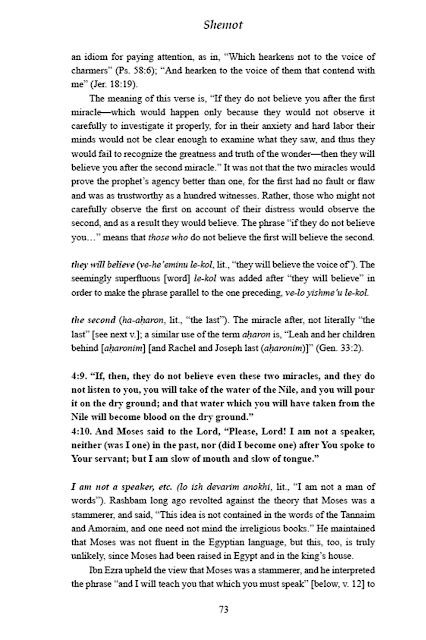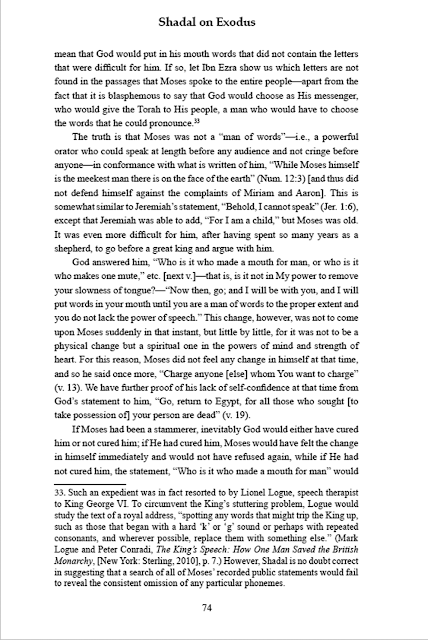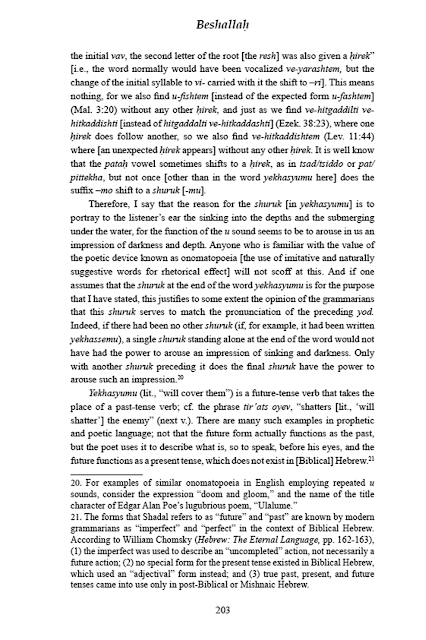Shadal on Exodus by Daniel A. Klein (Kodesh Press) – New Book Announcement
Order on Amazon or on the Kodesh Press website.
Very rarely in the history of parshanut has one author written both a translation of the entire Torah text and a complete Torah commentary in Hebrew. Most likely, no one has accomplished this feat since Shadal (Samuel David Luzzatto, 1800-1865). Now, the second volume of his Pentateuco is available in a new, all-English version—Shadal on Exodus: Samuel David Luzzatto’s Interpretation of the Book of Shemot, translated and edited by Daniel A. Klein (New York: Kodesh Press, 2015). This edition is a double translation, rendering into clear and modern English both Shadal’s Italian version of the text and his Hebrew perush. This marks the first appearance of Shadal’s complete work on Shemot in 143 years, since its original publication in Padua, 1872.
A great-grandnephew of Moshe Hayyim
Luzzatto (author of Mesillat Yesharim), Shadal served for more than 35
years as a professor of Bible, Hebrew, and Jewish history and religion at the
Collegio Rabbinico of Padua, where he mentored many of the future leaders of
Italian Jewry. Shadal was a superb
linguist, writer, and religious thinker, devoting his talents above all to parshanut. Although he was a devout believer in the
divinity, unity, and antiquity of the Torah, Shadal approached the text in a
remarkably open spirit of inquiry, drawing upon a wide variety of sources,
ancient and contemporary, Jewish and non-Jewish, and focusing on the “plain”
meaning (peshat) as he saw it. A
passionate scholar with a torrid “Italian” temperament, Shadal laced his
commentary with occasional touches of wit and sarcasm, and many of his
interpretations may strike even the modern reader as fresh and novel.
Luzzatto (author of Mesillat Yesharim), Shadal served for more than 35
years as a professor of Bible, Hebrew, and Jewish history and religion at the
Collegio Rabbinico of Padua, where he mentored many of the future leaders of
Italian Jewry. Shadal was a superb
linguist, writer, and religious thinker, devoting his talents above all to parshanut. Although he was a devout believer in the
divinity, unity, and antiquity of the Torah, Shadal approached the text in a
remarkably open spirit of inquiry, drawing upon a wide variety of sources,
ancient and contemporary, Jewish and non-Jewish, and focusing on the “plain”
meaning (peshat) as he saw it. A
passionate scholar with a torrid “Italian” temperament, Shadal laced his
commentary with occasional touches of wit and sarcasm, and many of his
interpretations may strike even the modern reader as fresh and novel.
Among his most interesting comments on the Book of Exodus are the
following:
following:
- Even when performing miracles, God prefers to adhere to the ways of nature in part. Thus, the plagues of Egypt resembled in some respect phenomena that were natural in Egypt, some occurring in one year and some occurring in another, except that in the year in question, all of them came clustered together, and each one contained a novel aspect that was not found in nature (see at Ex. 7:20). Similarly, the splitting of the Red Sea was a miraculous event mixed with natural elements, not entirely unlike a phenomenon that saved the Dutch fleet during a seventeenth-century war with England (see at Ex. 14:21). In so holding, Shadal rejected on the one hand the extreme attempts by some moderns to naturalize the Exodus miracles, and on the other hand any fanciful embellishments by more traditional scholars that “unnecessarily overloaded the Torah’s account with signs and wonders.”
- In the phrase tehomot yekhasyumu (“the depths covered them”) in the Song of the Sea, the grammatically strange and unique word yekhasyumu is best explained as a use of onomatopoeia—that is, the employment of an imitative and naturally suggestive word for rhetorical effect—because the double “u” sound arouses an impression of darkness and depth and thus portrays to the listener’s ear the enemy’s sinking into the deep waters (see at Ex. 15:5). In fact, Shadal’s treatment of the entire Song is the pearl of his Exodus perush. In the course of his commentary on chapter 15, he includes, among other things, (1) a discussion of why ancient Hebrew poetry contains traces of Aramaic, (2) a thorough explanation of the poetic device of parallelism, (3) an essay on the derivation and semantics of the word kodesh (“holiness”), and for good measure, (4) a stinging diatribe against the philosophy of Spinoza.
- One of the
purposes behind the collection of the silver half-shekel for the Tabernacle was
to diminish the people’s fear of the “evil eye” (see at Ex. 30:12). They were being counted, and the people
believed that a census might arouse the evil eye unless they paid a “ransom” to
help build the sanctuary. God did not
wish to abolish the folk belief in the evil eye altogether, since it had the
beneficial effect of keeping the people from putting too much trust in their
own might or wealth. In fact, said
Shadal, what the common people attributed to the evil eye—and modern scholars
just as misguidedly dismissed as coincidence—was a Divinely decreed phenomenon
of nature, that “pride goeth before the fall.”
Shadal on
Exodus is equipped with explanatory notes, a source index, a
subject and author index, and a list identifying the many and varied
authorities that Shadal cited.
Exodus is equipped with explanatory notes, a source index, a
subject and author index, and a list identifying the many and varied
authorities that Shadal cited.
The book may be ordered now on Amazon or on the Kodesh Press website.









One thought on “Shadal on Exodus by Daniel A. Klein (Kodesh Press) – New Book Announcement”
Bless you-thanks-May I add some more detail?